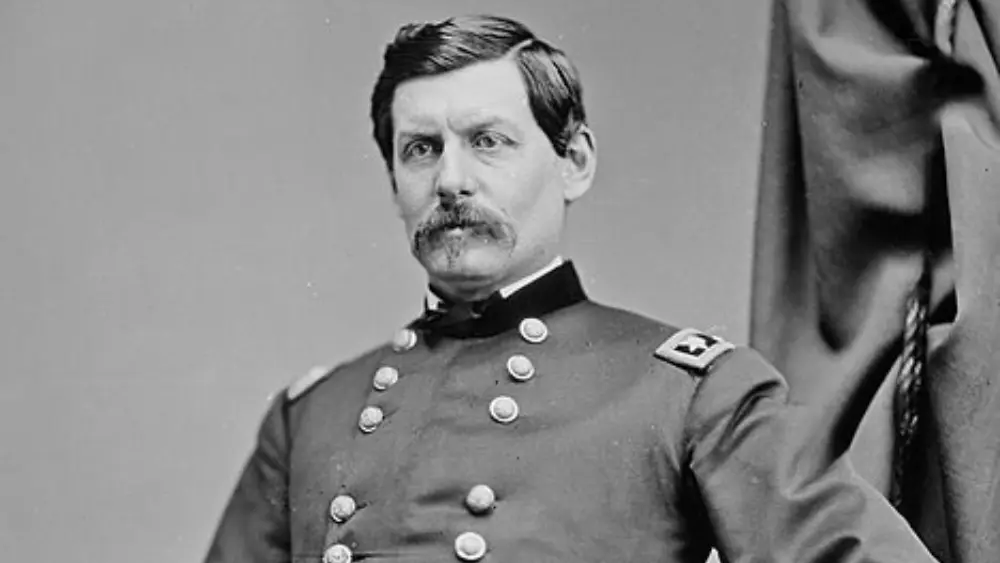George B. McClellan, born on December 3, 1826, in Philadelphia, Pennsylvania, emerged as a prominent Union Army general during the American Civil War. Known for his organizational skills and strategic acumen, McClellan earned the moniker “The Young Napoleon” for his early successes and leadership style.
Early Life and Military Education
George B. McClellan’s early life and education laid the foundation for his future military career. Born into a family with a strong military tradition, McClellan’s early years were characterized by a keen interest in engineering and a commitment to academic excellence. This intellectual curiosity led him to the United States Military Academy at West Point, where he excelled and graduated second in his class in 1846. McClellan’s educational achievements showcased his aptitude for military studies and set the stage for a promising career in the U.S. Army.
Graduating from West Point marked the beginning of McClellan’s military journey. He would soon find himself thrust into the challenging and unruly events of the mid-19th century, including the Mexican-American War and the looming tensions that would ultimately erupt into the Civil War. His early academic successes were indicative of the strategic mindset and leadership qualities that would later shape his role as a prominent Union general during one of the most pivotal periods in American history.
George B. McClellan: Known for in the U.S. Military: Success in the Mexican-American War
George B. McClellan’s early military service in the Mexican-American War showcased his exceptional talents and set the stage for his future prominence in the Union Army. McClellan’s engineering skills and leadership capabilities became evident as he played a crucial role in various campaigns during the conflict. His success in the war earned him commendations, and his strategic acumen was recognized by his superiors. McClellan’s experiences in the Mexican-American War not only solidified his reputation as a capable military officer but also provided valuable lessons that would shape his approach to leadership in the years to come.
The achievements and recognition garnered by McClellan during the Mexican-American War marked the beginning of a military career that would see him rise to prominence during the Civil War. The experiences and leadership qualities developed in the earlier conflict would prove instrumental as McClellan faced the challenges of leading Union forces in a deeply divided nation.
Civilian Pursuits and the Railroad Industry
After his military service, George B. McClellan transitioned into civilian pursuits, making a notable impact in the railroad industry. McClellan’s keen organizational skills and efficiency, traits he had honed during his military career, became evident in this new arena. His contributions to the railroad industry highlighted his ability to manage complex logistical operations and marked the continuation of the leadership qualities that would define his later role as a military commander.
McClellan’s experience in the civilian sector, particularly in the railroad industry, further demonstrated his adaptability and effectiveness in organizational matters. These experiences provided valuable insights into the management of resources, coordination of large-scale operations, and the strategic planning that would become crucial aspects of his leadership during the Civil War.
George B. McClellan: Commander of the Army of the Potomac
In 1861, during the early stages of the Civil War, George B. McClellan reached the zenith of his military career when he was appointed commander of the Army of the Potomac. Through his leadership style, which focused on discipline, training, and organization, McClellan transformed the Army of the Potomac from a disorganized force into a well-disciplined and effective fighting unit. His emphasis on drilling and rigorous training endeared him to his troops and earned him praise for instilling a sense of confidence and cohesion within the army.
Under McClellan’s command, the Army of the Potomac became a formidable force, ready for major engagements. However, McClellan’s cautious approach and reluctance to engage in decisive actions drew criticism, and his tenure as commander would be marked by both successes and controversies, setting the stage for his complex legacy in the annals of Civil War history.
Strategic Deliberation and the Peninsula Campaign
During the Peninsula Campaign in 1862, George B. McClellan’s strategic deliberation and meticulous planning were on full display. As the commander of the Army of the Potomac, McClellan aimed to capture the Confederate capital of Richmond, Virginia. The campaign involved complex amphibious operations and saw initial successes, such as the capture of Yorktown and the Battle of Williamsburg. McClellan’s ability to maneuver his forces and establish secure supply lines demonstrated his organizational skills.
However, McClellan’s cautious approach and reluctance to press a decisive advantage came under scrutiny. Despite having numerical superiority and achieving tactical victories, he hesitated to launch a full-scale assault on Richmond, allowing Confederate General Robert E. Lee to regroup and counterattack. The cautious nature of McClellan’s command contributed to the eventual withdrawal of Union forces from the Peninsula without achieving the primary objective of capturing Richmond. This aspect of the Peninsula Campaign would be a source of controversy and would impact McClellan’s standing within the Union leadership and public perception.
George B. McClellan: Known for in the U.S. Military: Presidential Candidate and Controversial Leadership
George B. McClellan’s political ambitions extended beyond the battlefield, leading him to become the Democratic candidate in the 1864 presidential election. Running against the incumbent President Abraham Lincoln, McClellan positioned himself as a moderate candidate advocating for a negotiated peace with the Confederacy. His platform aimed to end the Civil War through diplomatic means, emphasizing reconciliation over continued military conflict.
However, McClellan’s political career was overshadowed by controversies stemming from his military leadership during the war. His strained relationship with President Lincoln, marked by disagreements over strategy and McClellan’s perceived reluctance to aggressively engage Confederate forces, contributed to his removal from command. While presenting an alternative vision for ending the war, McClellan’s candidacy ultimately saw the electorate re-elect Lincoln, reaffirming the Union’s commitment to the continuation of the conflict until the restoration of the Union was achieved.

Post-War Career and Legacy
Following the Civil War, George B. McClellan transitioned to a post-war career that included diplomatic and engineering roles. He contributed to the completion of the Atlantic and Great Western Railroad, showcasing his skills beyond the battlefield. Despite his early military successes and organizational talents, McClellan’s legacy is a subject of historical debate.
While some view McClellan as a capable organizer who successfully transformed the Army of the Potomac into a formidable force, others criticize his cautious and hesitant approach to military operations. His reluctance to press decisive advantages during the Peninsula Campaign and clashes with President Lincoln led to his removal from command, impacting his historical standing. McClellan’s complex legacy reflects the challenges and controversies of leadership during an unruly period in American history.











